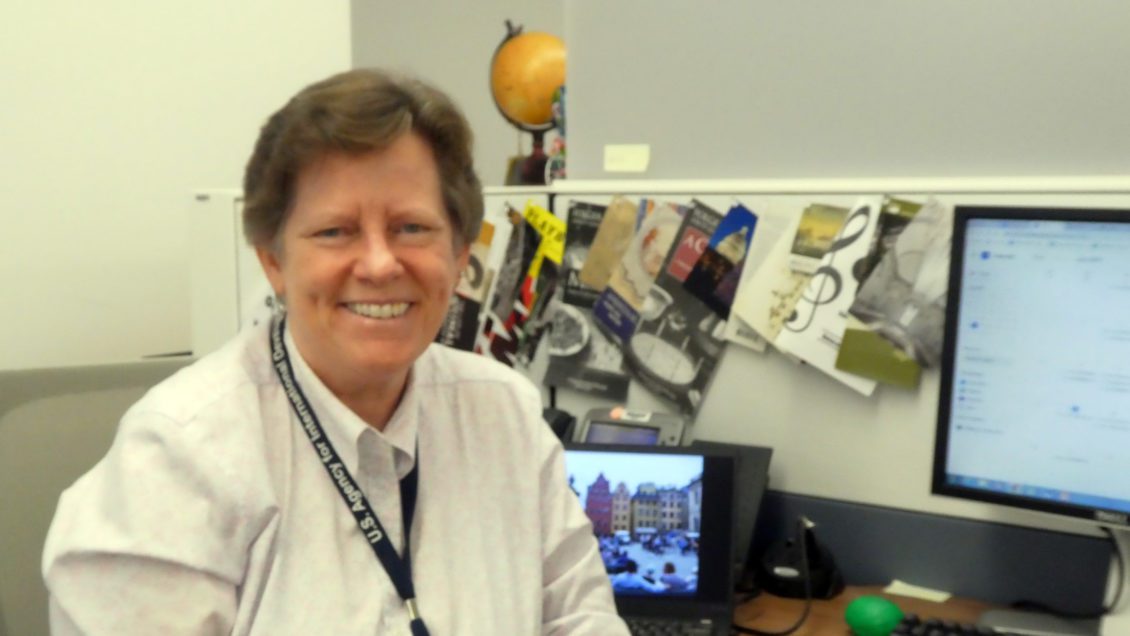
When June Pilcher was selected as Clemson’s first Jefferson Science Fellow, she was put in an unusual position. Pilcher, alumni distinguished professor in Clemson’s psychology department, was flattered by the honor, excited about the upcoming experience and a little puzzled by the fact that she had no idea what exactly she’d be doing.
Sure, she had a good idea that the National Academies of Sciences, Engineering and Medicine selected her for the role to take advantage of her expertise on how stress, sleep, physical activity and the environment affect people’s productivity, health and well-being. However, she didn’t know how or where that expertise would be used, or whose health and well-being would be studied.
As it turns out, the employees of the U.S. Agency for International Development (USAID) Global Development Lab selected Pilcher in order to examine themselves and the rest of the agency. Pilcher says most of the work she did served a human resources role in the implementation of a new performance appraisal process for employees of the agency.
“I didn’t anticipate that, but after I got started it made sense that they would want a psychologist’s input on how to explain this new system to the foreign service officers and how to train them to relay their accomplishments using it,” Pilcher says. “I really enjoyed seeing what day-to-day life was like within this government agency and out in the field.”

Pilcher did get the opportunity to meet the agency’s field officers where they work, specifically in Guatemala and El Salvador. She got to observe existing training processes, and Pilcher gave talks for officers on topics such as the human brain, occupational health and developing better communication strategies.
Field agents with USAID are often placed in areas that can become unsafe for both them and their families because of political or military conflicts. The agency’s counselors consulted Pilcher about stress relief for foreign service officers both when they must be evacuated and when they return to their mission. One of the more interesting projects she worked on had to do with using occupational health data to help predict these conflicts before they happen.
“The challenge was not putting yet another survey in front of USAID employees but using existing data to find predictors of a ‘fire’—so to speak—before that fire gets out of control,” Pilcher says. “An example was looking at sick leave and the frequency with which it’s taken because employees often use it more often as stress mounts. That, along with other data, might help USAID see a problem on the horizon.”
Pilcher was also working in the nation’s capital during the longest government shutdown in U.S. history that lasted from Dec. 22, 2018 to Jan. 25, 2019. While this did have an effect on the progress of the work she conducted, she came away from the experience with a greater respect for government employees that she feels are often overlooked during these shutdowns.
Pilcher says she sympathized with the employees who—by law—couldn’t come to work even though they wanted to. At the same time, she came away impressed by those who were at work and couldn’t possibly attend to the many requests and issues that piled up on their desks.
“These are government employees who are extremely dedicated to their jobs even in times of great stress and unpredictability,” Pilcher says. “Obviously, there was no time or funding available to study the effects on employees during a government shutdown, but of course that’s what I wanted to do!”

Pilcher did get the opportunity to see some museum exhibits that appealed to her interests, such as a Japanese art exhibit in the Smithsonian National Gallery of Art. She also caught one of the weekly parades performed by the U.S. Marine Corps soldiers that included precision marching and impressive instrumentation and went bowling with other fellows in the White House.
Pilcher says that although she relished her time in D.C., she’s happy to be back in Clemson classrooms with her home department. She says she feels honored to have served as Clemson’s first Jefferson Science Fellow, which she feels will help open the door for future faculty members to engage in the program.
“Engaging with government agencies is great for Clemson, and the benefits only increase when those agencies are doing work on a global scale,” Pilcher says. “I’d like to think that the work I did to aid government employees goes on to have a positive effect in the U.S. and abroad.”
The Jefferson Science Fellows program was established in October 2003 as a new model for engaging the American academic science, technology, engineering and medical communities in the formulation and implementation of U.S. foreign policy and international development programming. The program is administered by the National Academies of Sciences, Engineering, and Medicine and is supported through a partnership between the U.S. academic community, professional scientific societies, the U.S. Department of State and the U.S. Agency for International Development.
END
Get in touch and we will connect you with the author or another expert.
Or email us at news@clemson.edu

